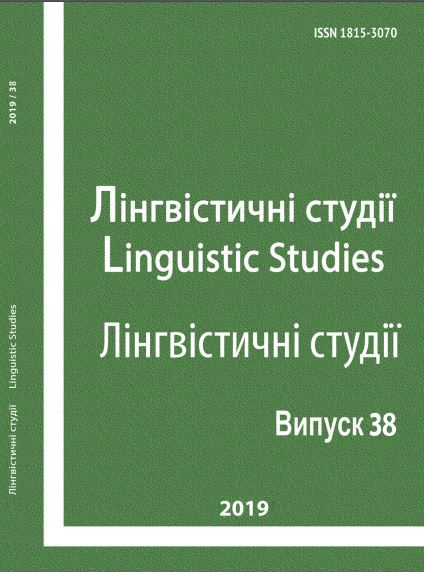Functional-comunicative Innovations in Modern Syntax: Objective Space.
DOI:
https://doi.org/10.31558/1815-3070.2019.38.1Keywords:
segmentation, complement, functional-communicative innovation, objective syntax, logizationAbstract
The purpose of the research is to define qualification and classification parameters of segmentation, amplification within the limits of implementation of distinctions of functional-communicative innovations including defining the substantive and / or non-favourite linear-contextual, both text-oriented vertical and text-oriented horizontal positions. The defined purpose evokes resolving the relevant tasks: 1) to qualify segmentation and amplification within the distinction category; 2) to determine the main variety of functional-communicative innovations in linear-contextual in-sentence and text-oriented vertical paradigm; 3) to classify segmentation, parceling, logization in the lingual-social objective-syntactic dimension; 4) to define functional yield of segmentation and amplification, violation of internal syntagmatic deviant from coordination within the in-sentence structure; 5) to characterize correspondence of centripetal and centrifugal forces in the in-sentence structure with distinctive strong points.
The theoretical value of the research is caused by deep distinction reasoning in objective linguo-social grammar on the syntax and morphology levels including defining segmentation and amplification status, logization in the structure of the distinction category. The novelty of the analysis is defined by distinction clarification in diverse in-system units (internal textual formations) and distinguishing its correlation with other equal and non-equal derivatives. The practical value of the study is foregrounded by the opportunity to use its results in the university practical courses on syntax of the language theory and general linguistics, scientific researches on active processes in grammar harmony of Ukrainian and other Slavonic languages investigations.
References
Akimova, Galina. Novoe v sintaksise sovremennogo russkogo yazyika (New in the syntax of modern Russian language). Moskva: Vyisshaya shkola, 1994. Print.
Balli, Sharl’. Frantsuzskaya stilistika (French style). Moskva: Editorial URSS, 2001. Print.
Bacevych, Floriy. Osnovy komunikatyvnoi linhvistyky (Fundamentals of Communicative Linguistics). Kyiv: Akademiia, 2004. Print. Valgina, Nadezhda. Aktivnyie protsessyi v sovremennom russkom yazyike (Active processes in modern Russian). Moskva: Logos, 2003. Print.
Zahnitko, Anatolii. Teoretychna hramatyka suchasnoi ukrainskoi movy. Morfolohiia. Syntaksys (Theoretical grammar of modern Ukrainian. Morphology. Syntax). Donetsk: VKF «BAO», 2011. Print.
Zahnitko, Anatolii. Slovnyk suchasnoi linhvistyky: poniattia i terminy: V 4-kh t. (Dictionary of Modern Linguistics: Concepts and Terms: In 4 vols.). Donetsk: Donetskyi natsionalnyi universytet, 2012. Print.
Zahnitko, Anatolii. Movnyi prostir hramatyky (Linguistic space of grammar). Vinnytsia: Tvory, 2018. Print.
Zolotova, Galina, Onipenko, Nadezhda, Sidorova, Marina. Kommunikativnaya grammatika russkogo yazyika (Communicative grammar of the Russian language). Moskva: Institut russkogo yazyika, 2002. Print.
Zorina, Yulia. “Teoriia sehmentatsii v linhvistytsi (Segmentation theory in linguistics)”. Mova I kul`tura (Language and culture) 10. V. X (110) (2008): 62–64. Print.
Zorina, Yulia. «“Nazyvnyi uiavlennia” i “nazyvnyi temy” yak linhvistychni terminy ("Nominal Imagination" and "Noun Theme" as Linguistic Terms)». Linhvistychni studii Linguistic Studies (Linguistic studios Linguistic Studies) 27 (2013): 84–88. Print.
Kostovs`ka, A. “Piat riznovydiv dyskryminatsii zhinok u ZMI (Five varieties of discrimination against women in the media)”. Zapysky z ukrainskoho movoznavstva (Notes from Ukrainian Movement) 24(2) (2017): 51–58. Print.
Lyubeznova, Natalya. Aktivnyie protsessyi v sovremennom russkom yazyike (Active processes in modern Russian). Saratov: Saratovskiy gosudarstvennyiy sotsialno-ekonomicheskiy universitet, 2010. Print.
Mozhova, Y. “Partseliatsiia yak yavyshche ekspresyvnoho syntaksysu (na materiali nimetskykh reportazhiv) (Parcellation as a phenomenon of expressive syntax (based on German reports))”. Naukovi zapysky Natsionalnoho universytetu “Ostrozka akademiia”. Seriia: Filolohichna (Scientific notes of Ostroh Academy National University. Series: Philological) 30 (2012): 68−71. Print.
Mihaylov, Leonid. Kommunikativnaya grammatika nemetskogo yazyika (Communicative German Grammar). Moskva: Vyisshaya shkola, 1994. Print.
Norman, Boris. Sintaksis rechevoy deyatelnosti (Speech syntax). Minsk: Vyisshaya shkola, 1978. Print.
Petriv, Kh. “Partseliatsiia yak pryiom ekspresyvnoho syntaksysu v systemi idiostyliu Oksany Pakhlovskoi (Partnership as a primer of expressive syntax in the system of idostyle Oksani Pakhlovsky)”. Linhvostylistychni studii (Linguistic studies studio) 2 (2015): 126−133. Print.
Skovorodnikov, Aleksandr. Ekspressivnyie sintaksicheskie konstruktsii sovremennogo russkogo literaturnogo yazyika: opyit sistemnogo issledovaniya (Expressive syntactic constructions of the modern Russian literary language: the experience of systemic research). Tomsk: Tomskiy universitet, 1981. Print.
Strelnikova, A. “Kommunikativnaya grammatika angliyskogo yazyika: metodyi prepodavaniya v tehnicheskom vuze. (Communicative Grammar of the English Language: Teaching Methods at a Technical University)”. Molodoy uchenyiy (Young scientist) 8 (2015): 1039–1042.
Taranenko, Oleksandr. Aktualizovani modeli v systemi slovotvorennia suchasnoi ukrainskoi movy (kinets ХХ – pochatok ХХI st.) (Models Updated in the System of Word Formation of Modern Ukrainian Language (end of XX – Beginning of XXI Century)). Kyiv: Vydavnychyi Dim Dmytra Buraho, 2015. Print.
Toftul, Mykhailo. Lohika: slovnyk-dovidnyk (Logic: Dictionary dictionary). Kyiv: Akademiia, 2012. Print.
Haritonova, Ekaterina. “Dinamika strukturyi sintaksisa sovremennogo russkogo yazyika: tendentsii k ekonomichnosti i k distinktnosti (The dynamics of the syntax structure of the modern Russian language: trends towards efficiency and distinction).” Diss. Volgograd: Volgograd Gosudarstvennyi U, 2014. Abstract. Print.
Yungerova, O. “Partsellirovannaya konstruktsiya kak mikrotekst (Parcel design as microtext)”. Vestnik Chelyabinskogo gosudarstvennogo pedagogicheskogo universiteta (Bulletin of the Chelyabinsk State Pedagogical University) 7 (2002): 330–336. Print.


